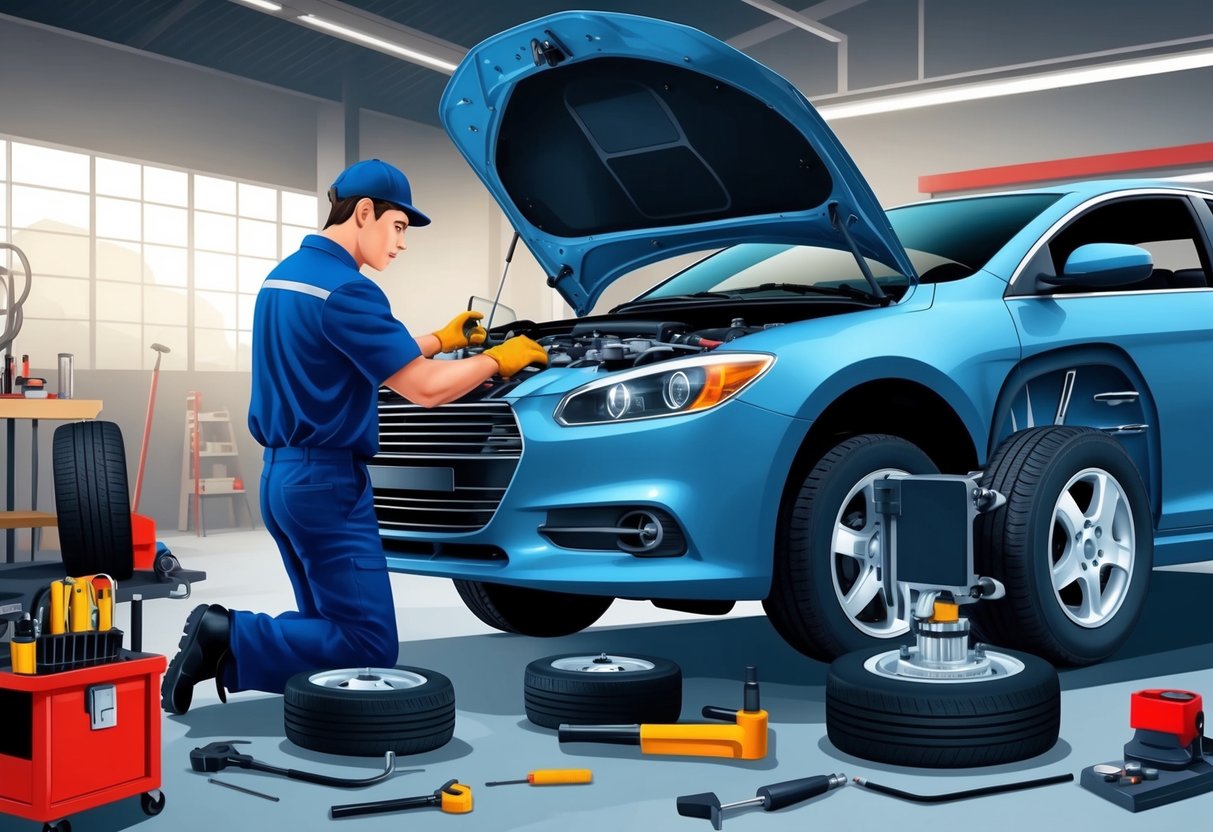
Proactive Steps to Prevent Major Repairs
Paying close attention to early warning signs, staying on top of essential inspections, and addressing simple components like gas caps can minimize the risk of expensive auto repairs. Consistent action on these areas greatly improves vehicle reliability and reduces the likelihood of major mechanical failures.
Recognizing the Check Engine Light
When the check engine light activates, it signals that the vehicle’s onboard diagnostics system has detected an issue. Ignoring this important alert can lead to larger, more costly problems as minor faults go unaddressed and escalate.
Drivers should investigate the cause as soon as possible with a diagnostic scan, which most auto shops and parts stores can perform. Promptly scheduling repairs when the check engine light appears helps prevent related systems from being damaged.
Problems can range from simple issues like a loose gas cap to more complex concerns such as oxygen sensor failures or engine misfires. Addressing the warning immediately reduces the risk of additional repair expenses and extended downtime.
Scheduling Pre-Trip Checkups
Before any long journey, it’s critical to conduct a comprehensive pre-trip checklist. This proactive step helps identify potential issues before they disrupt travel and lead to major repairs.
Typical pre-trip inspections include checking fluid levels, brakes, tires, lights, belts, and the battery. Technicians recommend scheduling a pre-trip checkup with a trusted mechanic, especially for older vehicles or those that haven’t been serviced recently.
They should verify that vital systems are working correctly and address issues such as worn brake pads, inadequate tire tread, or leaks that could become urgent during a trip. Regular pre-trip checkups ensure a safer, smoother journey and help prevent the sudden breakdowns that often result in expensive repair bills.
For more on preventive steps for auto care, see these car maintenance tips.
Ensuring Properly Sealed Gas Caps
A loose or damaged gas cap might seem harmless, but it plays a key role in the car’s emission system and fuel efficiency. When the gas cap is not sealed tightly, fuel vapors can escape, potentially triggering the check engine light.
Frequent inspection and replacement of worn gas caps help avoid unnecessary diagnostic visits and maintain proper pressure in the fuel system. An old or cracked gas cap can cause lost fuel and allow moisture or debris into the tank.
Keeping the gas cap properly secured is one of the simplest yet most effective preventative maintenance habits, as outlined on this preventative maintenance guide.
Frequently Asked Questions
Proper car maintenance extends a vehicle’s lifespan and reduces the risk of unexpected breakdowns. It also lowers overall repair bills.
Maintenance needs will vary based on a car’s age, mileage, manufacturer recommendations, and driving habits.
What are the essential items on a basic car maintenance checklist?
A basic car maintenance checklist should include regular oil changes, tire rotations, brake inspections, battery condition checks, and fluid level verification.
Inspecting headlights, taillights, and wipers for proper function increases safety. Checking the air filter and topping up windshield washer fluid are also crucial steps.
Refer to detailed guidance on common car maintenance FAQ topics for additional specifics.
How often should you follow a car maintenance schedule for optimal vehicle health?
Most vehicles benefit from a maintenance check every 5,000 to 7,500 miles. Intervals can differ based on the manufacturer and model.
Following the schedule in the owner’s manual ensures that recommended services occur at the correct times.
Some maintenance tasks, like checking tire pressure and fluid levels, should be done monthly. Other services, including brake inspections and oil changes, are typically performed according to specified mileage intervals.
What does the 30-60-90 rule entail for car maintenance?
The 30-60-90 rule refers to the service schedule recommended by many manufacturers, where major maintenance checks and replacements occur at 30,000-mile increments.
At 30,000 miles, items like air filters and fuel filters might be replaced. At 60,000 miles, drivers should inspect the brakes, battery, and transmission fluid.
At 90,000 miles, spark plugs, timing belts, and hoses often require attention to prevent failure.
Which car maintenance tasks can help prevent the most expensive repairs?
Preventative actions such as regular oil changes, routine brake inspections, and timely replacement of fluids are among the most cost-effective.
Addressing worn brake pads quickly helps prevent rotor damage. Checking battery terminals and keeping the battery clean can safeguard against electrical issues.
Tire rotations reduce uneven wear and the risk of blowouts. Additional preventative tips can help avoid major repair costs.
How can you determine the appropriate car maintenance by mileage?
Maintenance schedules are often outlined by mileage milestones in the owner’s manual.
Oil and filter changes are usually necessary every 5,000–7,500 miles, while tire rotations may occur every 5,000–8,000 miles.
Higher mileage maintenance—at intervals such as 30,000, 60,000, and 90,000 miles—typically involves more extensive checks, such as fluid flushes and timing belt inspections.
What guidelines should you follow to minimize car maintenance costs?
Adhering strictly to the maintenance schedule recommended by the vehicle manufacturer helps avoid unnecessary repairs. Using quality parts and fluids reduces the chance of failures and repeat repairs.
Driving habits impact maintenance costs as well. Avoiding sudden starts or stops and not overloading the vehicle can limit wear.
Regularly monitoring for warning lights and addressing issues early can prevent small problems from escalating into expensive repairs. More preventive maintenance advice is available at Preventative Car Maintenance: Tips To Avoid Expensive Auto Repairs.